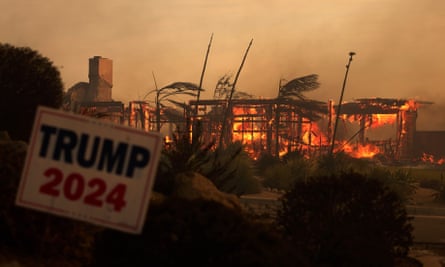News
The UK must ramp up its efforts on renewable energy to foster national security in an increasingly uncertain world, the energy secretary, Ed Miliband, has warned, on the eve of a fraught global summit on the climate crisis.
He pledged that the UK would lead efforts at Cop29 to secure the global agreement needed to stave off the worst impacts of climate breakdown, in talks that have been thrown into turmoil by the re-election of Donald Trump as US president.
“The only way to keep the British people secure today is by making Britain a clean-energy superpower, and the only way we protect future generations is by working with other countries to deliver climate action,” Miliband told the Observer. “This government is committed to accelerating climate action precisely because it is by doing this that we protect our country, with energy security, lower bills, and good jobs.”
Trump, who has repeatedly dismissed climate science as a “hoax”, has vowed to withdraw the US again from the Paris climate agreement, as he did late in his last presidency. Scientists have warned that his policies would put paid to hopes of limiting global temperature rises to 1.5C above pre-industrial levels, regarded as the threshold of safety.
Governments are now scrambling to save vital alliances that were led by the outgoing US president, Joe Biden, who made the climate a top priority of his term. At Cop29, governments are supposed to agree ways to bring global financial muscle to bear on the climate crisis. Though a team from the Biden White House will still attend, the inevitability that Trump will withdraw US support means other countries have to redraw their expectations, given the prospective absence of – and perhaps future hostility from – the world’s biggest economy.

The summit, taking place in Azerbaijan’s capital, Baku, over the next fortnight, has been hit by a flurry of late cancellations. The president of the EU Commission, Ursula von der Leyen, will not attend, and the German chancellor, Olaf Scholz, will stay in Berlin following the break-up of his governing coalition. Emmanuel Macron, president of France, is also occupied by a domestic political crisis.
António Guterres, the UN secretary general, will be at the talks, with the leaders of about 100 countries, mostly from the developing world, which is struggling with the increasing economic impacts of climate-driven disaster.
Keir Starmer, who will spend nearly two days at the talks, is one of the few remaining leaders of the world’s biggest industrialised economies who will attend. He is expected to announce tough new targets for the UK to cut greenhouse gases, and a commitment to fulfil a pledge of £11.6bn in climate finance to poor countries, made under the Conservatives but left hanging in the balance by Rishi Sunak.
Miliband, who will take personal charge rather than leaving the negotiating to junior ministers and civil servants as the previous government did, made clear that Britain would step into the leadership vacuum. “We will be going to Cop with the power of our example to call for others to do their fair share because climate breakdown knows no borders. The UK will step up and lead – to protect our people, and play our part in securing a future for our planet,” he said.
Adair Turner, former chair of the UK’s Committee on Climate Change, now chair of the Energy Transitions Commission thinktank, warned that despite “happy talk” from some governments and civil society groups seeking to minimise the impact, the shadow of Trump would weigh heavily. “There is a tendency by some people to try to keep their spirits up by whistling in the dark. But this [Trump’s election] is bad, let’s be clear. We will not get further US action beyond the Inflation Reduction Act [under which hundreds of billions of dollars were supposed to be spent on clean energy] and we needed that.”
Poor countries are hoping for a settlement in Baku that will deliver at least $1tn a year by 2035 for them to cut their greenhouse gas emissions and cope with increasingly extreme weather. Developed-country governments are only likely to agree that a much smaller sum, which could be significantly less than $400m in the absence of the US, should come from public sources, such as overseas aid budgets, the World Bank and other publicly owned finance institutions.
after newsletter promotion
They also want large emerging economies, such as China, and petrostates such as Saudi Arabia, Qatar and the United Arab Emirates, to contribute to the funds.
Several studies have shown that taxing fossil fuels could provide all of the finance needed, but moves to do so would face fierce objections from petrostates. Some countries are also arguing strongly for a small tax on billionaires, who have seen their wealth boosted to record levels since the Covid-19 pandemic.
Levies on high-carbon activities such as flying and shipping are also possible means of raising cash. There are likely to be disagreements over how much of the $1tn demanded should come from the private sector, and what safeguards can be put in place to ensure that poor countries get access to the money they need without being pushed further into debt.
David Hillman, director of the group Stamp Out Poverty, part of the Make Polluters Pay coalition, said: “The UK government must not use Trump’s election as a justification not to step up at Cop with the scale of ambition on finance required to meet the size of the challenge that confronts us, similarly to how uncertainty around Brexit was once engineered by some countries to halt important progress on taxing the banks.”
